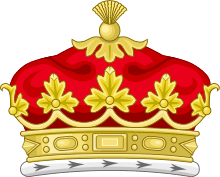James Carnegie, 3rd Duke of Fife
| His Grace The Duke of Fife | |
|---|---|
 Portrait by Allan Warren, 1985 | |
| Preceded by | Princess Arthur of Connaught, 2nd Duchess |
| Succeeded by | David Carnegie, 4th Duke of Fife |
| Personal details | |
| Born |
James George Alexander Bannerman Carnegie 23 September 1929 |
| Died | 22 June 2015 (aged 85) |
| Spouse(s) | Caroline Dewar (m. 1956–66) |
| Parents |
Charles Carnegie, 11th Earl of Southesk Princess Maud of Fife |
James George Alexander Bannerman Carnegie, 3rd Duke of Fife[1] (23 September 1929 – 22 June 2015) was the grandson of Louise, Princess Royal, a daughter of King Edward VII of the United Kingdom. As a female-line great-grandson of a British sovereign, he did not carry out royal or official duties or receive any funds from the Civil List. He was the second cousin of Queens Elizabeth II and Margrethe II and King Harald V of Norway. Through his maternal grandfather, he was also a descendant of King William IV and Dorothea Jordan.
Early life
The Duke was the only son of the 11th Earl of Southesk (1893–1992) and his wife, Princess Maud (1893–1945), the younger daughter of the 1st Duke of Fife and Louise, Princess Royal. One of his godparents was the King, his mother's maternal uncle, who was represented at the christening by his eldest son and heir, The Prince of Wales.
The Duke was educated at Ludgrove, Gordonstoun School, and at the Royal Agricultural College, Cirencester. He served with the Scots Guards in Malaya in 1948–50. He served as vice patron of the Braemar Royal Highland Society and of the British Olympic Association.
Duke of Fife
The Dukedom of Fife was first granted in 1889 to the Duke's grandfather, the 6th Earl of Fife, by Queen Victoria on his marriage to Princess Louise of Wales, the eldest daughter of the Prince of Wales. In April 1900, the first Duke received a new patent as Duke of Fife and Earl of Macduff in the Peerage of the United Kingdom, this time with a special remainder to his daughters by Princess Louise and their male issue. As the only surviving children of the Duke and Princess Louise were two daughters, the dukedom eventually passed to Princess Alexandra of Fife, who later became Princess Arthur of Connaught.
On 26 February 1959, the duke succeeded his maternal aunt, Princess Arthur of Connaught, Duchess of Fife, as Duke of Fife and Earl of Macduff, because her only child, Alastair, 2nd Duke of Connaught and Strathearn, had predeceased her. On 16 February 1992 the third Duke also succeeded his father as Earl of Southesk and as chief of the Clan Carnegie.
He lived at Elsick House, on his estate near Stonehaven in Kincardineshire and also farmed the family estate around Kinnaird Castle, Brechin. His interests included sports cars, driving a Ford Zephyr 6 in the 1955 Monte Carlo Rally. [2]
Marriage

(photograph by Allan Warren, 1984)
As a young man, the Duke's name was variously linked with Princess Margaret, ballerina Mary Drage, and sportswoman Divina Galica.
On 11 September 1956, the then Lord Carnegie married The Hon. Caroline Dewar (born 12 February 1934), the elder daughter of the 3rd Baron Forteviot. They divorced in 1966.
The marriage produced three children:[3]
- Stillborn son (4 April 1958)
- The Lady Alexandra Clare Carnegie (20 June 1959) she married Mark Fleming Etherington on 11 May 2001. They have one daughter.
- David Carnegie, 4th Duke of Fife (3 March 1961) he married Caroline Anne Bunting on 16 June 1987. They have three sons.
Other titles
In addition to being 3rd Duke of Fife, he was also:
- 12th Earl of Southesk (Peerage of Scotland)
- 3rd Earl of Macduff (Peerage of the United Kingdom)
- 12th Lord Carnegie of Kinnaird (Peerage of Scotland)
- 12th Lord Carnegie, of Kinnaird and Leuchars (Peerage of Scotland)
- 4th Baron Balinhard of Farnell in the County of Forfar (Peerage of the United Kingdom)
- 9th Carnegie Baronet (Baronetage of Nova Scotia)
Ancestry
Arms
  |
|
See also
References
- ↑ David Brown (1 September 1995). "DNA Proves Bones Belong To Last Czar; Mystery of Nicholas's Missing Body Is Solved". Washington Post. Retrieved 26 January 2011.
The other was a distant cousin, James GAB Carnegie, the third Duke of Fife, of Scotland...
- ↑ "Obituary: Duke of Fife". Herald Scotland.
- ↑ thePeerage.com http://www.thepeerage.com/p10160.htm#i101598
External links
- Hansard 1803–2005: contributions in Parliament by the Duke of Fife
| Peerage of the United Kingdom | ||
|---|---|---|
| Preceded by Princess Arthur of Connaught |
Duke of Fife 2nd creation 1959–2015 |
Succeeded by David Carnegie |
| Peerage of Scotland | ||
| Preceded by Charles Alexander Carnegie |
Earl of Southesk 1992–2015 |
Succeeded by David Carnegie |